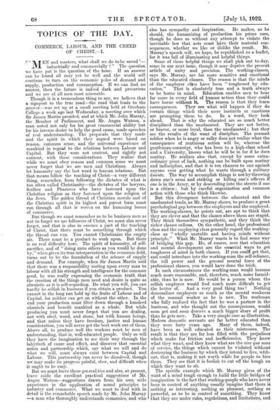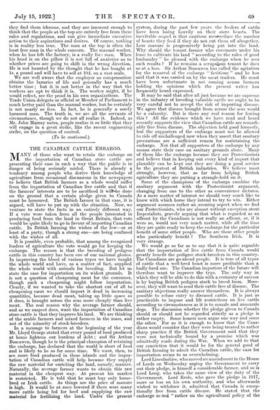TOPICS OF THE DAY.
COMMERCE, LABOUR, AND THE CREED OF CHRIST.—I.
MEN and masters, what shall we do to be saved '— industrially and commercially ? " The question we have put is the question of the hour. If an answer can be found all may yet be well and the world will continue to turn on the economic pales of demand and supply, production and consumption. If we can find no answer, then the future is indeed dark and precarious and we are of all men most miserable.
Though it is a tremendous thing to say, we believe that a signpost to the true road—the road that leads to the Answer—was set up at a small meeting held at Gresham College a week ago last Wednesday, a meeting over which Sir James Martin presided, and at which Mr. John Murray, the Member of Parliament, and Mr. Angus Watson, a man noted not only for his great commercial ability but for his intense desire to help the good cause, made speeches of real understanding. The proposals that they made and the spirit in which they argued were based on reason, common sense, and the universal experience of mankind in regard to the relations between Labour and Capital. But they were not content, and rightly not content, with these considerations. They realize that while we must obey reason and common sense we must never forget that we are men and Christians. Always let humanity say the last word in human relations. But that means follow the teaching of Christ—a very different thing, remember, from following the dictates of what is too often called Christianity—the dictates of the lawyers, Scribes and Pharisees who have fastened upon the Christian religion as they fastened upon the religion of the Jews. The golden thread of Christian morals and of the Christian spirit in its highest and purest form must run through all that is woven on the humming looms of commerce.
But though we must remember so to be business men as not to forget we are followers of Christ, we must also never forget, and that is also in essence a part of the teaching of Christ, that there must be something through which the thread can run. You cannot Christianize the empty air. There must be a product to work upon. But there is no real difficulty here. The spirit of humanity, of self- sacrifice, and of " doing unto others as you would be done by," when given its true interpretation in the economic field, turns out to be the foundation of the science of supply and demand. For example, when Sir James Martin said that there was a responsibility resting upon every man to labour with all his strength and intelligence for the common good, he was really expressing the economic truth that the creation of the things men need and desire is quite as altruistic as it is self-regarding. Do what you will, you can hardly be selfish in business if you obtain a product. You cannot in the long run hold up the fruits of Labour and of Capital, for neither can get on without the other. In the end your production must filter down through a hundred channels and benefit mankind as a whole. But while producing you must never forget that you are dealing, not with steel, wood, and stone, but with human beings, and that unless they have freedom, justice and human consideration, you will never get the best work out of them. Above all, to produce well the workers must be men of understanding, that is, well-educated people. Only so will they have the imagination to see their way through the labyrinth of cause and effect, and discover that essential union and partnership which, say what we will and do what we will, must always exist between Capital and Labour. This partnership can never be dissolved, though we may make its progress painful, slow, and difficult when it ought to be easy.
But we must leave these generalities and also, at present, leave aside the excellent practical suggestions of Mr. Angus Watson—suggestions drawn from his own wide experience in the application of sound principles to industry and commerce. What we want to deal with in detail is the remarkable speech made by Mr. John Murray —a man who thoroughly understands economics; and who also has sympathy and inspiration. He makes, as he should, the humanizing of production his prime care, though he does so without any attempt to violate the inevitable law that acts must have their material con- sequences, whether we like or dislike the result. Mr. Murray's speech will, we hope, be republished as a leaflet, for it was full of illuminating and helpful things. Some of these helpful things we shall pick out to-day, some in our next issue, though it may deprive the present article of unity and precision. The working-classes, says Mr. Murray, are far more sensitive and emotional than the educated classes. The reason is that the minds of the employer class have been " toughened by edu- cation." That is absolutely true and a truth always to be borne in mind. Education enables men to bear far more in every field of human action than they could have borne without it. The reason is that they learn consequences. They see what will happen if they do certain things which their mere instincts or emotions are prompting them to do. In a word, they look ahead. That is why the educated are so much better disciplined than the uneducated. They are not better, or braver, or more loyal, than the uneducated ; but they see the results of the want of discipline. The peasant soldier when he is angry or sulky does not realize what the consequence of mutinous action will be, whereas the gentleman-conscript, who has been to a high-class school and a University, knows what he will be in for if he does mutiny. He realizes also that, except by some extra- ordinary piece of luck, nothing can be built upon mutiny and indiscipline, and that it is ten chances to one against anyone ever getting what he wants through a military Matte. The way to accomplish things is not by throwing down one's arms and striking or killing one's officers if one is in the Army, or by descending into the streets if one is a citizen ; but by careful organization and common action with those who think likewise.
But this divergence between the educated and the uneducated tends, as Mr. Murray shows, to produce a great psychological gap between the employers and the employed. The working-classes, he points out, are apt to think that they are clever and that the classes above them are stupid. They think themselves sympathetic, and they think the richer classes callous. On the other hand, the professional class and the employing class generally regard the working- class as " wholly unstable and having minds without principle." What Mr. Murray wants is to find some way of bridging this gap. He, of course, sees that education and mental development are the essential ways to get toughness of mind in both classes. If you could get that, and could introduce into the working-man the self-reliance, the will power and the general mental force of the professional classes, you would have done the trick. In such circumstances the working-man would become much more reasonable, and, therefore, much more formid- able, than he is now. He would be a person whom the selfish employer would find much more difficult to get the better of. And a very good thing too ! Nothing demoralizes employers so much as the mental weakness of the manual worker as he is now. The workman who fully realized the fact that he was a partner in the business, and who thought out the consequences, would soon get and soon deserve a much bigger share of profit than he gets now. Take a very simple case as illustration. Modern domestic servants are far better educated than they were forty years ago. Many of them, indeed, have been as well educated as their mistresses. The result is that they are far less filled with the prejudices which make for friction and inefficiencies. They know what they want, and they know what are the sine qua noes of service, the things which cannot be violated without destroying the business by which they intend to live, with- out, that is, making it not worth while for people to hire them. They see that it is foolish to cut off the bough on which they want to sit.
The specific example which Mr. Murray gives of the want of a mind tough enough to build the little bridges of imagination is the fact that working-people who have never been in control of anything usually imagine that there ii nothing so interesting, nothing so pleasant, nothing so, powerful, as to be in control of something. They know that they arc under rules, regulations, and limitations, and they find them irksome, and they are innocent enough to think that the people at the top are entirely free from these rules and regulations, and can give immediate executive action to their aspirations and desires. Of course, nothing is in reality less true. The man at the top is often the least free man in the whole concern. The manual worker, when he has left the factory, is a really fre 3 man. When his head is on the pillow it is not full of anxieties as to whether prices are going to shift in the wrong direction. He is not haunted by the thought that he has bought at ls. a pound and will have to sell at 10d. on a vast scale. We are well aware that .the employer as compensation obtains the luxuries of life and generally has a much better time ; but it is not better in the way that the workers are apt to think it is. The worker might, if he would reflect, see the proof in his own organizations. The Trade Union delegate or official or Member of Parliament is much better paid than the manual worker, but he certainly is not nearly so free. In fact, he is generally a sorely harassed man. The truth is, we are all the servants of circumstance, though we do not all realize it. Indeed, as Mr. John Murray notes, people realize it so little that they will engage in a great strike, like the recent engineering strike, on the question of control.
(To be continued.)



































 Previous page
Previous page